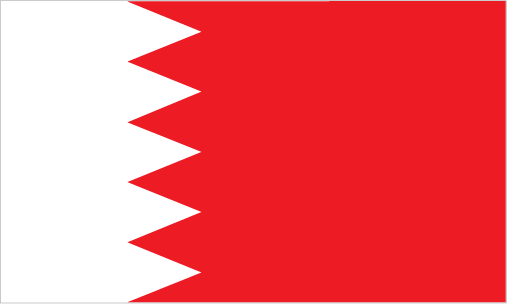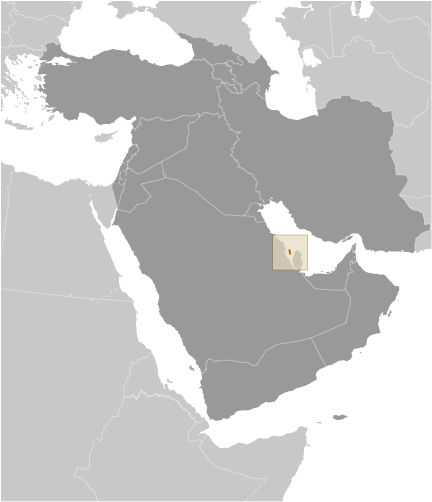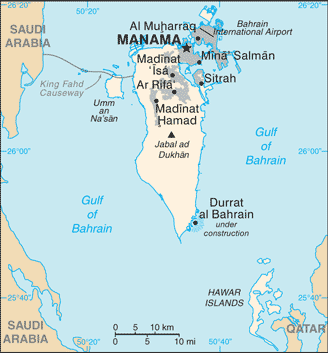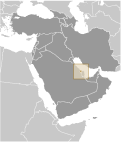
|
|
Advertisements:
EconomyEconomy - overview
Bahrain is one of the most diversified economies in the Persian Gulf. Highly developed communication and transport facilities make Bahrain home to numerous multinational firms with business in the Gulf. As part of its diversification plans, Bahrain implemented a Free Trade Agreement (FTA) with the US in August 2006, the first FTA between the US and a Gulf state. Bahrain's economy, however, continues to depend heavily on oil. Petroleum production and refining account for more than 60% of Bahrain's export receipts, 70% of government revenues, and 11% of GDP (exclusive of allied industries). Other major economic activities are production of aluminum - Bahrain's second biggest export after oil - finance, and construction. Bahrain competes with Malaysia as a worldwide center for Islamic banking and continues to seek new natural gas supplies as feedstock to support its expanding petrochemical and aluminum industries. In 2011, Bahrain experienced economic setbacks as a result of domestic unrest. Bahrain's reputation as a financial hub of the Gulf has been damaged, and the country now risks losing financial institutions to other regional centers such as Dubai or Doha. Economic policies aimed at restoring confidence in Bahrain's economy, such as the suspension of an expatriate labor tax, will make Bahrain's foremost long-term economic challenges - youth unemployment and the growth of government debt - more difficult to address. Gdp (purchasing power parity) World Ranking: 109
$31.5 billion (2011 est.)
$30.95 billion (2010 est.) $29.61 billion (2009 est.) Note Data are in 2011 US dollars Gdp (official exchange rate)
$26.11 billion (2011 est.)
Gdp - real growth rate World Ranking: 154
1.8% (2011 est.)
4.5% (2010 est.) 3.1% (2009 est.) Gdp - per capita (ppp) World Ranking: 49
$27,900 (2011 est.)
$28,000 (2010 est.) $28,500 (2009 est.) Note Data are in 2011 US dollars Gdp - composition by sector
Agriculture 0.4%
Industry 63.6% Services 36% (2011 est.) Labor force World Ranking: 153
666,000
Note 44% of the population in the 15-64 age group is non-national (2011 est.) Labor force - by occupation
Agriculture 1%
Industry 79% Services 20% (1997 est.) Unemployment rate World Ranking: 146
15% (2005 est.)
Population below poverty line
NA%
Household income or consumption by percentage share
Lowest 10% NA%
Highest 10% NA% Investment (gross fixed) World Ranking: 48
24.6% of GDP (2011 est.)
Budget
Revenues $7.491 billion
Expenditures $8.396 billion (2011 est.) Taxes and other revenues World Ranking: 99
28.7% of GDP (2011 est.)
Budget surplus (+) or deficit (-) World Ranking: 113
-3.5% of GDP (2011 est.)
Public debt World Ranking: 51
54% of GDP (2011 est.)
53.8% of GDP (2010 est.) Inflation rate (consumer prices) World Ranking: 2
-0.4% (2011 est.)
2% (2010 est.) Commercial bank prime lending rate World Ranking: 132
6.79% (31 December 2011 est.)
7.25% (31 December 2010 est.) Stock of narrow money World Ranking: 88
$7.013 billion (31 December 2011 est.) $6.127 billion (31 December 2010 est.) Stock of broad money World Ranking: 82
$21.64 billion (31 December 2011 est.) $20.92 billion (31 December 2010 est.) Stock of domestic credit World Ranking: 83
$20.37 billion (31 December 2011 est.) $17.26 billion (31 December 2010 est.) Market value of publicly traded shares World Ranking: 62
$17.15 billion (31 December 2011) $20.43 billion (31 December 2010) $16.93 billion (31 December 2009) Agriculture - products
Fruit, vegetables; poultry, dairy products; shrimp, fish Industries
Petroleum processing and refining, aluminum smelting, iron pelletization, fertilizers, Islamic and offshore banking, insurance, ship repairing, tourism Industrial production growth rate World Ranking: 129
1.5% (2010 est.)
Electricity - production World Ranking: 89
11.22 billion kWh (2008 est.)
Electricity - consumption World Ranking: 86
10.48 billion kWh (2008 est.)
Electricity - exports
0 kWh (2009 est.)
Electricity - imports
0 kWh (2009 est.)
Oil - production World Ranking: 63
46,430 bbl/day (2010 est.)
Oil - consumption World Ranking: 99
47,000 bbl/day (2010 est.)
Oil - exports World Ranking: 49
239,900 bbl/day (2009 est.)
Oil - imports World Ranking: 46
213,000 bbl/day (2009 est.)
Oil - proved reserves World Ranking: 66
124.6 million bbl (1 January 2011 est.) Natural gas - production World Ranking: 38
12.58 billion cu m (2009 est.)
Natural gas - consumption World Ranking: 41
12.58 billion cu m (2009 est.)
Natural gas - exports World Ranking: 56
0 cu m (2009 est.)
Natural gas - imports World Ranking: 152
0 cu m (2009 est.)
Natural gas - proved reserves World Ranking: 57
92.03 billion cu m (1 January 2011 est.) Current account balance World Ranking: 38
$3.247 billion (2011 est.)
$770 million (2010 est.) Exports World Ranking: 73
$19.91 billion (2011 est.)
$13.83 billion (2010 est.) Exports - commodities
Petroleum and petroleum products, aluminum, textiles Exports - partners
Saudi Arabia 3.3%, UAE 2.2%, Japan 2%, India 1.9% (2011) Imports World Ranking: 89
$12.11 billion (2011 est.)
$11.19 billion (2010 est.) Imports - commodities
Crude oil, machinery, chemicals Imports - partners
Saudi Arabia 27.5%, US 10.2%, India 7.9%, China 7.4%, Brazil 5.8%, Germany 4.7% (2011) Reserves of foreign exchange and gold World Ranking: 95
$4.245 billion (31 December 2011 est.) $4.789 billion (31 December 2010 est.) Debt - external World Ranking: 83
$14.93 billion (31 December 2011 est.) $14.5 billion (31 December 2010 est.) Stock of direct foreign investment - at home World Ranking: 75
$15.94 billion (31 December 2011 est.) $15.15 billion (31 December 2010 est.) Stock of direct foreign investment - abroad World Ranking: 52
$8.777 billion (31 December 2011 est.) $7.883 billion (31 December 2010 est.) Exchange rates
Bahraini dinars (BHD) per US dollar - 0.376 (2011 est.)0.376 (2010 est.) 0.376 (2009) 0.376 (2008) 0.376 (2007) Fiscal year
Calendar year
Comments
Add a new comment: |
Advertisement
Members area
Bahrain (Manama):
 
GPS points from Bahrain (Manama)
|
||||||||

 In 1783, the Sunni Al-Khalifa family captured Bahrain from the Persians. In order to secure these holdings, it entered into a series of treaties with the UK during the 19th century that made Bahrain a British protectorate. The archipelago attained its independence in 1971. Facing declining oil reserves, Bahrain has turned to petroleum processing and refining and has transformed itself into an international banking center. Bahrain's small size and central location among Persian Gulf countries require it to play a delicate balancing act in foreign affairs among its larger neighbors. In addition, the Sunni-led government has struggled to manage relations with its large Shia-majority population. During the mid-to-late 1990s, Shia activists mounted a low-intensity uprising to demand that the Sunni-led government stop systemic economic, social, and political discrimination against Shia Bahrainis. King HAMAD bin Isa Al-Khalifa, after succeeding his late father in 1999, pushed economic and political reforms in part to improve relations with the Shia community. After boycotting the country's first round of democratic elections under the newly-promulgated constitution in 2002, Shia political societies participated in 2006 and 2010 in legislative and municipal elections and Wifaq, the largest Shia political society, won the largest bloc of seats in the elected lower-house of the legislature both times. In early 2011, Bahrain's fractious opposition sought to ride a rising tide of popular Arab protests to petition for the redress of popular grievances. In mid-March 2011, with the backing of Gulf Cooperation Council (GCC) capitals, King HAMAD put an end to the mass public gatherings and increasingly disruptive civil disobedience by declaring a state of emergency. Manama also welcomed a contingent of mostly Saudi and Emirati forces as part of a GCC deployment intended to help Bahraini security forces maintain order. Since that time, intermittent efforts at political dialogue between the government and opposition have remained at a stalemate. The Bahrain Independent Commission of Inquiry (BICI), formed in June 2011 to investigate abuses during the unrest and state of emergency, released its final report in November 2011. The King fully endorsed the report, and since then Manama has begun to implement many of the BICI's recommendations, including improving policing procedures, reinstating fired workers, rebuilding some mosques, and establishing a compensation fund for those affected by the unrest and crackdown. Despite this progress, street protests have grown increasingly violent since the beginning of 2012.
In 1783, the Sunni Al-Khalifa family captured Bahrain from the Persians. In order to secure these holdings, it entered into a series of treaties with the UK during the 19th century that made Bahrain a British protectorate. The archipelago attained its independence in 1971. Facing declining oil reserves, Bahrain has turned to petroleum processing and refining and has transformed itself into an international banking center. Bahrain's small size and central location among Persian Gulf countries require it to play a delicate balancing act in foreign affairs among its larger neighbors. In addition, the Sunni-led government has struggled to manage relations with its large Shia-majority population. During the mid-to-late 1990s, Shia activists mounted a low-intensity uprising to demand that the Sunni-led government stop systemic economic, social, and political discrimination against Shia Bahrainis. King HAMAD bin Isa Al-Khalifa, after succeeding his late father in 1999, pushed economic and political reforms in part to improve relations with the Shia community. After boycotting the country's first round of democratic elections under the newly-promulgated constitution in 2002, Shia political societies participated in 2006 and 2010 in legislative and municipal elections and Wifaq, the largest Shia political society, won the largest bloc of seats in the elected lower-house of the legislature both times. In early 2011, Bahrain's fractious opposition sought to ride a rising tide of popular Arab protests to petition for the redress of popular grievances. In mid-March 2011, with the backing of Gulf Cooperation Council (GCC) capitals, King HAMAD put an end to the mass public gatherings and increasingly disruptive civil disobedience by declaring a state of emergency. Manama also welcomed a contingent of mostly Saudi and Emirati forces as part of a GCC deployment intended to help Bahraini security forces maintain order. Since that time, intermittent efforts at political dialogue between the government and opposition have remained at a stalemate. The Bahrain Independent Commission of Inquiry (BICI), formed in June 2011 to investigate abuses during the unrest and state of emergency, released its final report in November 2011. The King fully endorsed the report, and since then Manama has begun to implement many of the BICI's recommendations, including improving policing procedures, reinstating fired workers, rebuilding some mosques, and establishing a compensation fund for those affected by the unrest and crackdown. Despite this progress, street protests have grown increasingly violent since the beginning of 2012.